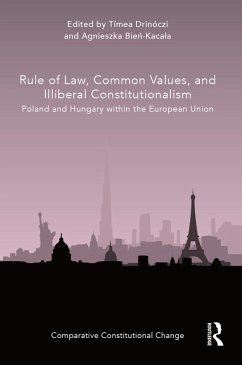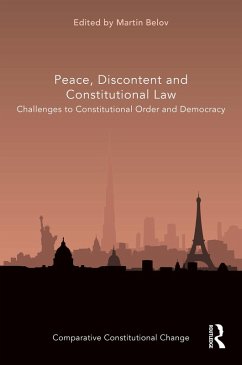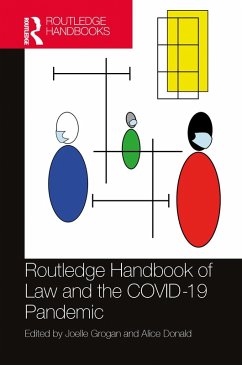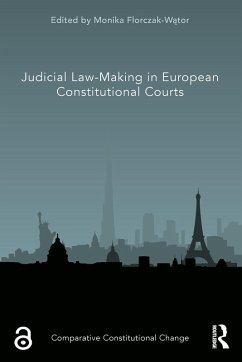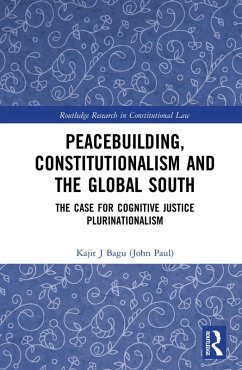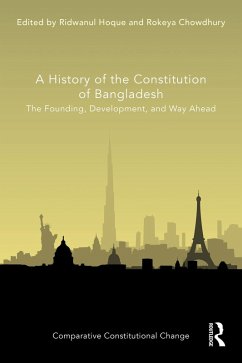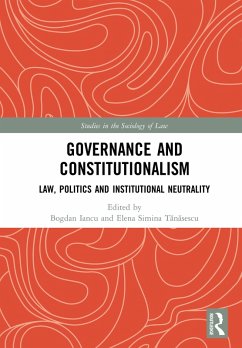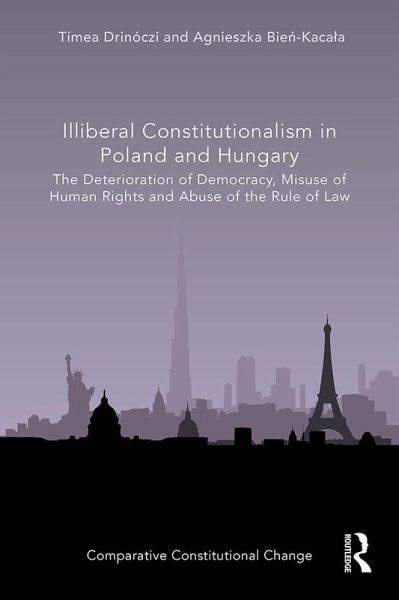
Illiberal Constitutionalism in Poland and Hungary (eBook, ePUB)
The Deterioration of Democracy, Misuse of Human Rights and Abuse of the Rule of Law
Versandkostenfrei!
Sofort per Download lieferbar
41,95 €
inkl. MwSt.
Weitere Ausgaben:

PAYBACK Punkte
21 °P sammeln!
This book theorizes illiberal constitutionalism by interrogation of the Rule of Law, democratic deterioration, and the misuse of the language and relativization of human rights protection, and its widespread emotional and value-oriented effect on the population.The work consists of seven Parts. Part I outlines the volume's ambitions and provides an introduction. Part II discusses the theoretical framework and clarifies the terminology adopted in the book. Part III provides an in-depth insight into the constitutional identity of Poles and Hungarians and argues that an unbalanced constitutional ...
This book theorizes illiberal constitutionalism by interrogation of the Rule of Law, democratic deterioration, and the misuse of the language and relativization of human rights protection, and its widespread emotional and value-oriented effect on the population.
The work consists of seven Parts. Part I outlines the volume's ambitions and provides an introduction. Part II discusses the theoretical framework and clarifies the terminology adopted in the book. Part III provides an in-depth insight into the constitutional identity of Poles and Hungarians and argues that an unbalanced constitutional identity has been moulded throughout Polish and Hungarian history in which emotional traits of collective victimhood and collective narcissism, and a longing for a charismatic leader have been evident. Part IV focuses on the emergence of illiberal constitutionalism, and, based on both quantitative and qualitative analyses, argues that illiberal constitutionalism is neither modern authoritarianism nor authoritarian constitutionalism. This Part contextualizes the issue by putting the deterioration of the Rule of Law into a European perspective. Part V explores the legal nature of illiberal legality when it is at odds and in compliance with the European Rule of Law, illiberal democracy, focusing on electoral democracy and legislative processes, and illiberalization of human rights. Part VI investigates whether there is a clear pattern in the methods of remodeling, or distancing from constitutional democracy, how it started, consolidated, and how its results are maintained. The final Part presents the author's conclusions and looks to the future.
The book will be an invaluable resource for scholars, academics and policy-makers interested in Constitutional Law and Politics.
The work consists of seven Parts. Part I outlines the volume's ambitions and provides an introduction. Part II discusses the theoretical framework and clarifies the terminology adopted in the book. Part III provides an in-depth insight into the constitutional identity of Poles and Hungarians and argues that an unbalanced constitutional identity has been moulded throughout Polish and Hungarian history in which emotional traits of collective victimhood and collective narcissism, and a longing for a charismatic leader have been evident. Part IV focuses on the emergence of illiberal constitutionalism, and, based on both quantitative and qualitative analyses, argues that illiberal constitutionalism is neither modern authoritarianism nor authoritarian constitutionalism. This Part contextualizes the issue by putting the deterioration of the Rule of Law into a European perspective. Part V explores the legal nature of illiberal legality when it is at odds and in compliance with the European Rule of Law, illiberal democracy, focusing on electoral democracy and legislative processes, and illiberalization of human rights. Part VI investigates whether there is a clear pattern in the methods of remodeling, or distancing from constitutional democracy, how it started, consolidated, and how its results are maintained. The final Part presents the author's conclusions and looks to the future.
The book will be an invaluable resource for scholars, academics and policy-makers interested in Constitutional Law and Politics.
Dieser Download kann aus rechtlichen Gründen nur mit Rechnungsadresse in A, B, BG, CY, CZ, D, DK, EW, E, FIN, F, GR, HR, H, IRL, I, LT, L, LR, M, NL, PL, P, R, S, SLO, SK ausgeliefert werden.





